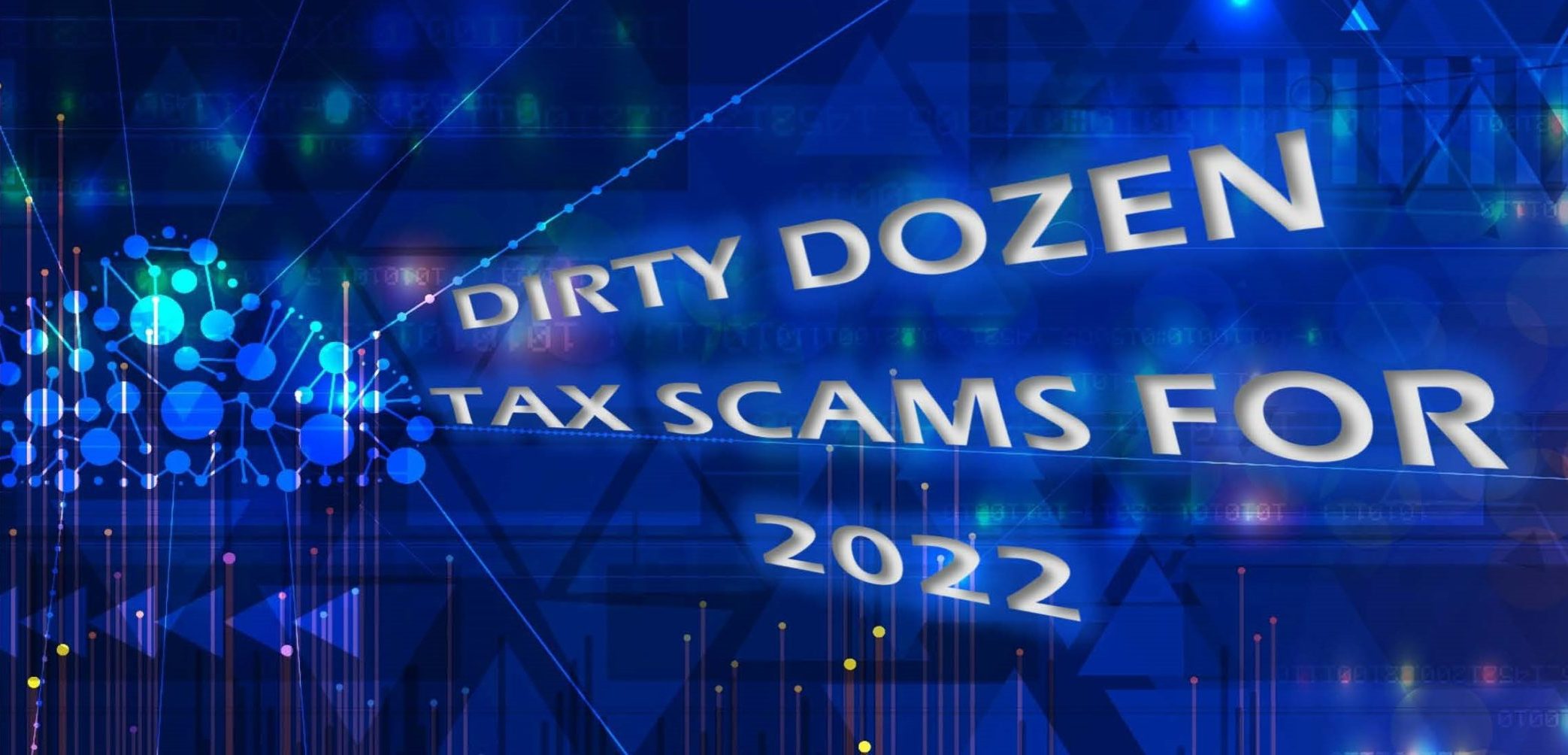DIRTY DOZEN TAX SCAMS FOR 2022
Every year the Internal Revenue Service (“IRS”) announces a list of twelve of the worst tax scams that taxpayer may encounter that year, it is referred to as the Dirty Dozen. This year’s list focuses on abusive transactions, deceitful tax companies, pandemic-related scams, and personal information scams. Taxpayers are encouraged to look out for these scams throughout the year, but they do tend to arise more during filing season.
This year’s Dirty Dozen scams are as follows:
1. Use of Charitable Remainder Annuity Trust (CRAT) to Eliminate Taxable Gain.
The IRS described a CRAT to which a taxpayer transfers appreciated property for which the taxpayer improperly claims a step-up in basis to its fair market value on the date of the transfer. The CRAT does not recognize gain when it sells the property and, with the proceeds, purchases a single-premium immediate annuity. The taxpayer or other beneficiary then recognizes only a small portion of the annuity payments as income, improperly claiming that the remainder represents a return of principal.
2. Maltese (or Other Foreign) Pension Arrangements Misusing Treaty.
In these transactions, taxpayers attempt to avoid U.S. tax by making contributions to certain foreign individual retirement arrangements in Malta (or possibly other foreign countries). In these transactions, the individual typically lacks a local connection, and local law allows contributions in a form other than cash or does not limit the amount of contributions by reference to income earned from employment or self-employment activities. By improperly asserting the foreign arrangement is a “pension fund” for U.S. tax treaty purposes, the U.S. taxpayer misconstrues the relevant treaty to improperly claim an exemption from U.S. income tax on earnings in, and distributions from, the foreign arrangement.
3. Puerto Rican and Other Foreign Captive Insurance.
The IRS described a captive insurance arrangement by a closely held entity with a Puerto Rican or other foreign corporation with “cell arrangements” or “segregated asset plans” in which a U.S. owner of the entity has a financial interest. The U.S. based individual or entity claims deductions for the cost of “insurance coverage” provided by a fronting carrier, which reinsures the “coverage” with the foreign corporation. The characteristics of the purported insurance arrangements typically will include one or more of the following: implausible risks covered, non-arm’s-length pricing, and lack of business purpose for entering into the arrangement.
4. Monetized Installment Sales.
This item, concerns an abuse of the installment sale rules under Sec. 453 by a seller who, in the year of a sale of property, effectively receives the sales proceeds through purported loans. In the year of the purported sale, the seller enters into a contract with the buyer for cash but then receives an installment note from an intermediary for the amount of sale proceeds in exchange for the sold property. The intermediary then sells the property to the buyer and receives the cash purchase price. The seller ultimately receives the proceeds as a nonrecourse, unsecured purported loan.
5. Pandemic-Related Scams including:
- Economic Impact Payment and Tax Refund Scams: Identity thieves who try to use Economic Impact Payments (EIPs), also known as stimulus payments, are a continuing threat to individuals. Any text messages, random incoming phone calls or emails inquiring about bank account information, requesting recipients to click a link or verify data should be considered suspicious and deleted without opening. This includes not just stimulus payments, but tax refunds and other common issues.
- Unemployment Fraud Leading to Inaccurate Taxpayer 1099-Gs: During the pandemic, many taxpayers lost their jobs and received unemployment compensation from their state. However, scammers also took advantage of the pandemic by filing fraudulent claims for unemployment compensation using stolen personal information of individuals who had not filed claims. Taxpayers should also be on the lookout for a Form 1099-G reporting unemployment compensation they didn’t receive.
- Fake Employment Offers Posted on Social Media: These fake posts entice their victims to provide their personal financial information. This information can then be used to file a fraudulent tax return for a fraudulent refund or in some other criminal endeavor.
- Fake Charities: These fraudulent schemes normally start with unsolicited contact by telephone, text, social media, e-mail, or in-person using a variety of tactics. They may even use websites with names very similar to those of real charities in order to trick taxpayers into providing money or personal financial information. Legitimate charities will provide their Employer Identification Number (EIN), if requested, which can be used to verify their legitimacy. Taxpayers can use the Tax-Exempt Organization Search on IRS.gov to find legitimate charities.
6. Deceitful Tax Companies.
This includes Offer in Compromise (OIC) “mills”, ghost preparers and preparers offering inflated refunds. OIC Mills make outlandish claims usually in local advertising exaggerate their ability to settle tax debts for “pennies on the dollar” through an OIC. These offers are available for taxpayers who meet very specific criteria under law to qualify for reducing their tax bill. These OIC mills will cast a wide net for taxpayers, charge them pricey fees and churn out applications for a program they are unlikely to qualify for. Ghost Preparers are paid preparers that will prepare your tax return but will not sign the return they prepare. By law, anyone who is paid to prepare or assists in preparing federal tax returns must have a Preparer Tax Identification Number (PTIN); and they must sign and include their PTIN on returns. Hiring a dishonest preparer can lead to potentially serious filing mistakes as well as possible tax fraud and the risk of losing their refund. Taxpayers should also avoid preparers who ask them to sign a blank return, promise a big refund before looking at the taxpayer’s records, or charge fees based on a percentage of the refund.
7. Suspicious communications designed to either trick, surprise or scare someone into responding before thinking.
The IRS warned everyone to be on the lookout for bogus calls, texts, emails and posts online designed to gain trust or steal. Here are some common scams the IRS continues to see. Taxpayers should take extra caution with these schemes, which continue to evolve and change:
- Text Message Scams: These scams are sent to taxpayers’ smartphones and can reference things like COVID-19 and/or “stimulus payments.” These messages often contain bogus links claiming to be IRS websites or other online tools. The IRS does not use text messages to discuss personal tax issues, such as those involving bills or refunds. The IRS also will not send taxpayers messages via social media platforms.
- Email Phishing Scams: The IRS does not initiate contact with taxpayers by email to request personal or financial information.
- Phone Scams: The IRS does not leave pre-recorded, urgent or threatening messages. In many variations of the phone scam, victims are told if they do not call back, a warrant will be issued for their arrest. Other verbal threats include law-enforcement agency intervention, deportation or revocation of licenses. Criminals can fake or “spoof” caller ID numbers to appear to be anywhere in the country, including from an IRS office.
8. Spear Phishing.
Spear phishing is an email scam that attempts to steal a tax professional’s software preparation credentials. These thieves try to steal client data and tax preparers’ identities in an attempt to file fraudulent tax returns for refunds. Spear phishing can be tailored to attack any type of business or organization, so everyone needs to be on the lookout and not rush to act when a strange email comes in. The latest phishing email uses the IRS logo and a variety of subject lines such as “Action Required: Your account has now been put on hold.” The IRS has observed similar bogus emails that claim to be from a “tax preparation application provider.” One such variation offers an “unusual activity report” and a solution link for the recipient to restore their account.
9. Concealing Assets in Offshore Accounts and Improper Reporting of Digital Assets.
The IRS remains focused on stopping tax avoidance by those who hide assets in offshore accounts and in accounts holding cryptocurrency or other digital assets. Taxpayers are taxed on worldwide income. The mere fact that money is placed in an offshore account does not put it out of reach of the U.S. tax system. Taxpayers are required, under penalty of perjury, to report income from offshore funds and other foreign holdings.
10. High-income Individuals who Don’t File Tax Returns.
Those who choose not to file a return even when they have a legal filing requirement, and especially those earning more than $100,000 per year who don’t file, represent a compliance problem that continues to be a top priority of the IRS.
11. Abusive Syndicated Conservation Easements.
While qualified conservation contributions as defined under Sec. 170(h) can yield legitimate charitable deductions, including properly established easements and other qualified real property interests, the IRS maintains an ongoing campaign to identify and deny improper tax benefits claimed from arrangements that fail the tests of law and regulation. Generally, these abusive arrangements are syndicated, using partnership arrangements lacking a legitimate business purpose. Often, their values are artificially inflated.
12. Abusive Micro-Captive Insurance Arrangements.
In abusive “micro-captive” structures, promoters, accountants, or wealth planners persuade owners of closely held entities to participate in schemes that lack many of the attributes of insurance. For example, coverages may “insure” implausible risks, fail to match genuine business needs or duplicate the taxpayer’s commercial coverages. The “premiums” paid under these arrangements are often excessive and are used to skirt the tax law.
Official IRS guidance can be found at https://www.irs.gov/newsroom/dirty-dozen
If you feel as though you have been a victim to any of these scams, please do not hesitate to reach out to our office at (404) 365-5682.




